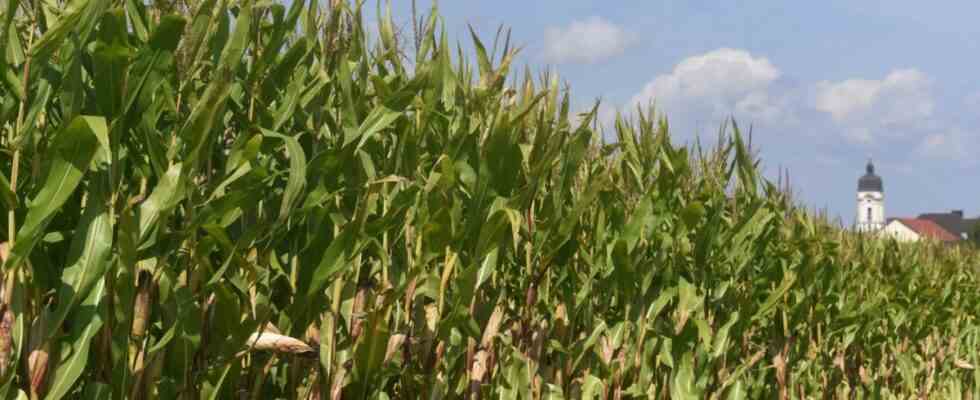It was too wet last year, too dry this year – German farmers don’t have it easy. This summer, the grain harvest was a little better than in 2021, but the harvest in Germany was still significantly less than the average in recent years.
For the Dachau district, Simon Sedlmair from Puchschläge, the Dachau district chairman of the Bavarian Farmers’ Association, draws a not so bad harvest balance, at least for the grain. “We’re better off here than in the north,” says the farmer. “Some types of grain couldn’t even be threshed there because nothing grew.” The district owes the fact that there were no extreme failures in the harvest here to the “good spring” and the condition of the soil, which could store water better. The cool and wet summer of 2021 also had a positive effect, says Sedlmair: “If it weren’t for the rain last year, we would have experienced a catastrophe.” The grain was ripe earlier than usual, but the harvest was average overall. The protein values are only slightly lower in wheat. “But we don’t need to complain about that,” said the BBV district chairman.
There are large harvest differences in the region
The situation is significantly different for corn, potatoes and sugar beets. The lack of water was much more noticeable in the so-called root crops, which have to grow longer on the field. “The failures here are more severe because at some point the water ran out,” explains Sedlmair. The losses would be around 30 percent. At the same time, he notes that this year it is particularly difficult to make precise assessments. It is unusual that there are very large differences in the harvest in the district – it has not rained the same amount everywhere.
The reason: This summer, there was hardly any area-wide rain, but rather localized thunderstorms. North of the district of Dachau, for example in Jetzendorf or Aichach, one had to contend with a major lack of water. But also in the municipality of Schwabhausen, where Sedlmair runs his farm, it was drier than in Dachau. “Sometimes it was completely dry here, and only a few kilometers away it rained fifteen liters.”
Climate change is also evident here in the district, says farmer and district chairman of the Bavarian Farmers’ Association Simon Sedlmair.
(Photo: Niels P. Joergensen)
Farmers who irrigated their fields with systems would have had a big advantage this summer: “They were able to save their potato and sugar beet harvest to some extent,” said the BBV district chairman. Farmer Georg Großmann-Neuhäusler irrigated at least part of his acreage in Vierkirchen-Pasenbach, but: “We will still have losses of 20 to 25 percent,” he suspects. The constant heat remains a problem: “If it’s constantly over 30 degrees, the irrigation doesn’t do much either.” Potatoes would no longer grow well from 25 degrees, for carrots it would be critical from 30 degrees.
Heat-related failures lead to food shortages
The hot summer was consistently bad for the grassland in the district. “Here we have at least 30 percent less yield,” says Sedlmair. A first and second cut was still possible, but then there was a “total failure”. This poses a big problem for farmers who keep livestock because next year they will most likely be short of fodder. The shortage of feed is already driving up prices on the market, reports the district chairman. Because not only here in the region, but throughout Germany and Europe, it is extremely dry. “The farmer who has to buy feed has to dig much deeper into his pocket – if he gets anything at all.”
The extreme drought is also causing problems for forestry operations. Trees are weakened, the bark beetle has an easy time. “The spruce is already suffering, the beech will have to, too,” predicts Sedlmair. Fields and forests definitely need rain over the fall and winter, “otherwise we’ll really experience a catastrophe next year.” Overall, the prospects for the future are not particularly good: “For several years we have had less and less rain during the growing season,” explains the Puchschlager, noting that the summer of 2021 was an exception. Climate change is also clearly noticeable here in the district.
The BBV calls for emergency aid and structural changes
Sedlmair estimates that if things continue like this, we will increasingly have to rely on sprinkler systems. However, not every farmer currently has such opportunities. The farmers’ association is therefore calling for emergency aid and structural changes. Farmers should not be left alone with the risks and problems caused by drought and heat damage. “The losses are not that extreme here. But in Franconia they have 50 to 60 percent losses,” the farmers will need financial support, says Sedlmair: “Livestock farmers will have to buy additional feed and farmers who don’t have a sprinkler system will be extremely distressed minus slide.”

